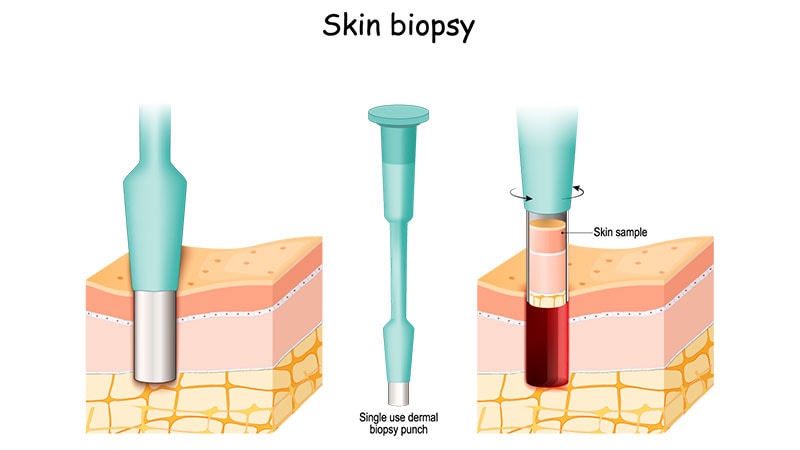Skin Biopsy Test Detects Neurodegenerative Disorders with High Accuracy
Core Concepts
Skin biopsy test accurately detects abnormal alpha-synuclein in neurodegenerative disorders.
Abstract
The content discusses a groundbreaking skin biopsy test that can accurately detect an abnormal form of alpha-synuclein in individuals with neurodegenerative disorders like Parkinson's disease. The test, known as Syn-One, identified phosphorylated alpha-synuclein (P-SYN) with 95.5% accuracy in a blinded, multicenter trial. This innovation holds promise for early identification of synucleinopathies and advancing drug development. The study, published in JAMA, highlights the urgent need for reliable diagnostic biomarkers in neurodegenerative diseases, affecting millions of individuals in the United States.
Key Highlights:
Skin biopsy test detects abnormal alpha-synuclein in neurodegenerative disorders.
Synucleinopathies include Parkinson's disease, dementia with Lewy bodies, and more.
Study shows high accuracy of the Syn-One test in identifying P-SYN.
Urgent need for reliable diagnostic biomarkers in neurodegenerative diseases.
Skin Test Accurately Detects Neurodegenerative Disorders
Stats
The test identified phosphorylated alpha-synuclein (P-SYN) with 95.5% accuracy in the blinded, multicenter trial.
The study included 428 adults aged 40-99 years, with 277 diagnosed with PD, DLB, MSA, or PAF.
Quotes
"With a simple, minimally invasive skin biopsy test, this blinded, multicenter study demonstrated how we can more objectively identify the underlying pathology of synucleinopathies and offer better diagnostic answers and care for patients." - Christopher Gibbons, MD
Key Insights Distilled From
by Eve at www.medscape.com 03-26-2024
https://www.medscape.com/viewarticle/skin-test-accurately-detects-parkinsons-other-2024a10005nx
Deeper Inquiries
What are the implications of a skin biopsy test for the early diagnosis of neurodegenerative disorders?
The use of a skin biopsy test for the early diagnosis of neurodegenerative disorders, such as Parkinson's disease (PD) and dementia with Lewy bodies (DLB), has significant implications. This test, which can detect abnormal forms of alpha-synuclein with high accuracy, offers a minimally invasive and accessible method for identifying synucleinopathies. By providing a reliable diagnostic biomarker, the skin biopsy test can lead to earlier detection of these disorders, enabling healthcare providers to initiate treatment and interventions sooner. This early diagnosis can potentially improve patient outcomes, quality of life, and prognosis by allowing for timely management strategies to be implemented.
How might the use of skin biopsy tests impact the development of treatments for synucleinopathies?
The utilization of skin biopsy tests, such as the Syn-One test that detects phosphorylated alpha-synuclein (P-SYN), can have a profound impact on the development of treatments for synucleinopathies. By accurately identifying the underlying pathology of these neurodegenerative disorders, researchers and pharmaceutical companies can gain valuable insights into the disease mechanisms and progression. This knowledge can facilitate the development of targeted therapies that specifically address the abnormal protein deposition seen in synucleinopathies. Additionally, the ability to diagnose these disorders early through skin biopsy tests can aid in the recruitment of suitable participants for clinical trials, ultimately expediting the drug development process and leading to more effective treatments for PD, DLB, MSA, and PAF.
How can advancements in diagnostic tools like the Syn-One test shape the future of personalized medicine?
Advancements in diagnostic tools, such as the Syn-One test for detecting P-SYN in skin biopsies, have the potential to revolutionize personalized medicine. By providing a more objective and accurate method of diagnosing synucleinopathies, these tools enable healthcare providers to tailor treatment plans to individual patients based on their specific disease pathology. This personalized approach to medicine allows for targeted therapies that address the underlying molecular mechanisms of each patient's condition, leading to more effective and personalized treatment outcomes. Furthermore, the use of diagnostic tests like the Syn-One test can pave the way for precision medicine, where interventions are customized to each patient's unique genetic, environmental, and lifestyle factors, ultimately improving patient care and outcomes in the field of neurodegenerative disorders.
0
More on Healthcare
